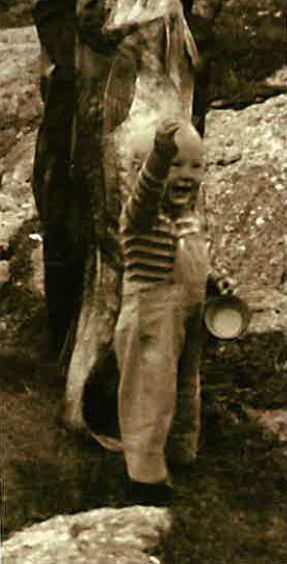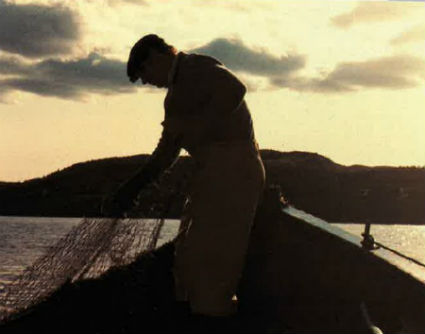When Friends Are Like Family
By Neil Earle
 Author in front of record-breaking 5-foot-11 inches, 150-pound codfish caught by his father in Labrador in 1949.
Author in front of record-breaking 5-foot-11 inches, 150-pound codfish caught by his father in Labrador in 1949.Do not forsake your friend and the friend of your father.... There is a friend who sticks closer than a brother. – Proverbs 27:10; 18:24
WHEN FRIENDS are like family, their cares and fears, their griefs and tears become yours. When my father called to tell me that his best friend and excellent neighbor, Ephraim Laing ("Eph" to his friends), had been taken from us, I was jolted by the news.
"He was like your uncle, wasn't he?" said my wife when she saw how crushed I was.
My uncle? Yes, and more than an uncle. A friend. My father's friend. That tearing sense of grief I will remember for a long time. But also the lessons learned. For one, we discover, as we get older, that we have reserves buried deep inside us, almost another self that is able to evaluate – with surprising objectivity – what is happening to us.
Even as we struggle to process grief, nature's spiritual immune system seems to rally to help us through the shock.
In the case of Eph, my childhood memories came flooding back. The words of the New England poet Henry Wadsworth Longfellow suddenly took on more meaning:
"A boy's will is the wind's will
And the thoughts of youth are long, long thoughts."
For those of you who were fortunate to grow up in small-town North America in the 1950s, when friends were often like family, my reactions might echo some of yours.
Mysteries of Life
I was struck, first of all, with the profoundly reverent and mystical feelings that the death angel leaves behind. The sense of time passing, a fascination at the steady, inexorable tide of life that bears us along – all of this coalesced quickly.
It was strange and it was haunting, and in its own way it was quite wonderful. The death of a loved one arrests and transfixes us. We feel a sense of awe for the deep, deep mystery of life and death – things my generation of baby boomers (those born between 1946 and 1964) are having to come to terms with more often.
The words of an old hymn I had learned in church – Eph's church, too – seemed more meaningful. The words were based on Psalm 90:
"Time, like an ever-rolling stream,
Bears all its sons away;
They fly forgotten, as a dream
Dies at the opening day."
The writer of the Song of Songs in the aptly named Wisdom Literature of the Old Testament obliquely referred to these mysteries of life and death. When the romantic heroine in this enduring (and misunderstood) love poem wanted to express the strength and permanence of her love, she used a strange expression:
"Place me like a seal over your heart, like a seal on your arm; for love is as strong as death, its jeal-ousy unyielding as the grave.... Many waters cannot quench love; rivers cannot wash it away" (Song of Songs 8:6-7).
Death is inevitable. Like love, it is uncompromising. C.F. Keil and F. Delitzsch see the parallels: "Love is like it [death] in this, that it also seizes upon men with irresistible force" (Commentary on the Old Testament, Vol. 6, page 146).
One thing to learn at the death of a friend who is as close as family is this: You will get through it. And it has many precious lessons to teach about the sacredness of life and the human experience.
 Ephraim Laing at a labor of love, pulling his nets at sunrise off Carbonear, Newfoundland.
Ephraim Laing at a labor of love, pulling his nets at sunrise off Carbonear, Newfoundland."No Man Is an Island"
Something else came to mind, another facet of the spiritual anesthetic that helps us cope with grief.
Death's arrival helps us better understand our own lives. At Eph's death, I was struck by a far deeper appreciation of being part of a loving community of deeply cherished friends and relationships.
Eph's death made me more conscious than ever of the precious web of life, the deep associations of fathers, mothers, children, youthful joys and dreams. The long, long thoughts of youth.
All of this took some of the edge off the grief and hurt, even if it could not (and I did not want it to) dry up the tears.
Tears at the passing of a friend as close as family are one of the greatest tributes you can give. They ex-press a sense of pride, of honor even, of having known someone who left behind the legacy of a life well lived. In Eph's case – a devoted wife, eight successful children, a good name. This, too, is a spiritual antidote for death's sense of loss.
I hadn't realized until Eph's passing how much he and all the Laings – my boyhood friends, the folks in that dear little town – are a part of me, will be a part of me to the end.
The death of my father's friend brought home that there are a lot of quiet, God-fearing, decent folks out there who pay the bills, work at their jobs, raise their children, trim their hedges and paint their houses. In small ways and in many anonymous sacrificial acts, they strengthen the ties that bind, they tighten the cords of community.
Today, we hear a lot about family values. Many of you, our readers, live them. As we do, the gentle and stately tide of life bears us all along, connects us all.
And how thankful we can be for friends and family! We do not have to face life and death alone. We are born into a web of relationships. The apostle Paul put it well in Romans 14:7-8: "For none of us lives to himself alone and none of us dies to himself alone. If we live, we live to the Lord; and if we die, we die to the Lord. So, whether we live or die, we belong to the Lord."
John Donne, a close student of Paul's writings, expressed this human sense of community:
"No man is an island, entire of itself; every man is a piece of the continent, a part of the main...any man's death diminishes me, because I am involved in mankind."
Wise words. Well put.
Adults Make a Difference
And, finally, something else sharply etched inside me at Eph's death. How easily we adults can underestimate the influence we can have on young people, the next generation. It may seem unrewarding at times, but any efforts invested in youth may pay rich dividends later.
Eph's sudden death triggered those long, long thoughts of youth, of days when time seemed infinite and friendship forever. Of fathers and their sons, the Earles and the Laings, crowded into a tiny dory for a long summer evening on a placid harbor catching squid (a species mostly used for bait).
Thoughts of youth, now seasoned by reflection. You felt as snug as a bug in a rug. You knew who you were, you knew who your family was, and you had neighbors like the Laings, the Oates, the Greens and the Frenches. God's in his heaven; all's well with the world.
The last time I saw Ephraim Laing was on a calm, clear day in September 1993 back home among the rocky cliffs of home – Newfoundland, in eastern Canada. Eph and his best friend, my dad, were setting out to catch some codfish just off the headland of our little town of Carbonear.
I knew, somehow, I had to make that trip. This was my youth passing before me again.
Eph caught more fish than any of us that day – and my father is no mean fisherman! I remember walking up and saying, "Thanks for taking me out."
Two months later he was gone.
Adults must never forget – their influence on the younger generation is vast. Our actions can shape young lives for good.
"The thoughts of youth are long, long thoughts." When friends are like family, those thoughts will always stay with you.